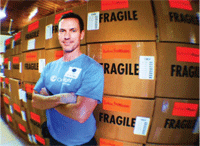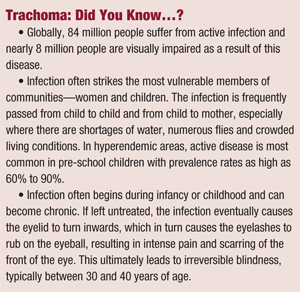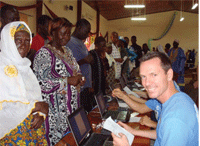They say talk is cheap, but I don’t think so. It’s amazing—and sometimes touching—that even just a few words can really mean so much.
Several weeks ago, my friend and general manager at my practice, Kim Orcutt, had asked me to donate a few eye exams for a fundraiser for AnMed Health System. Being more than happy to help out, I did so and thought nothing of it.
Shortly after that, I got a call about helping out at a one-week free eye care clinic in Burkina Faso, Africa, which was sponsored by OneSight (a global volunteer eye care initiative supported by Luxottica). I hadn’t planned on going, but I was asked to cover for a doctor who could not attend the clinic. So I agreed and starting to get the necessary papers together.

|
| Optometrist Michael Siebert stands beside supplies bound for Africa. Somewhere inside are doses of azithromycin—the primary treatment for trachoma.
|
Knowing that trachoma, the leading cause of the world’s infectious blindness, is prevalent in Africa, I did not want to leave the United States without the proper medication or any shortage of treatment options.
Trachoma Treatment
So, I started to investigate if there was anyone willing to make a donation of Zithromax (azithromycin, Pfizer)—the primary treatment for trachoma—for the trip. Initially, I tried contacting the manufacturer and a few local organizations, but nothing panned out.
Just a few days prior to departure, Kim overheard my conversation with a local pharmacy about making a donation or providing the medication at cost. Kim then informed me that the eye exam donation that I had made was organized by Kat Mueller, R.Ph., a local pharmacist. Immediately, Kim was on the phone with Kat. Within a few days, I had five treatment doses for trachoma—allowing me to treat the infection if I encountered it during my visit.

|
I arrived in Africa on October 3—after 54 hours of travel. Burkina Faso is in the central-western part of the African continent. It lies between the Sahara Desert and the coastal rain forests. We were stationed at Bobo-Dioulasso, Burkina Faso’s second largest city.
On day two of the clinic, I was working in the eyeglass dispensing area, and Molly Hastings, M.D., another volunteer doctor, came and informed me that she had diagnosed an elderly woman with a more advanced case of trachoma—but one eye had not scarred over yet.

|
| Dr. Siebert was among 40 volunteers who examined thousands of patients in Burkina Faso. The azithromycin came in handy on the second day, when an elderly woman presented with advanced trachoma.
|
Thanks to the help of many people—a coordinated effort of many caring individuals—a woman in Africa will maintain the vision of one of her eyes.
It all started off with a simple reminder from a friend, a doctor with a knowledge of common pathology in third-world countries, a manager with a heart and local contacts, and a pharmacist who returned a favor, which in turn saved the sight of fragile aging woman in sub-Saharan Africa.
Remember that the decisions you make and the words you choose can and do affect others, whether you are aware of the results or not. Maybe talk is cheap, but it can also be invaluable.
Dr. Siebert ( www.drmichaelsiebert.com) is in private practice in Anderson, S.C., and participates in volunteer eye clinics one or more times a year.

